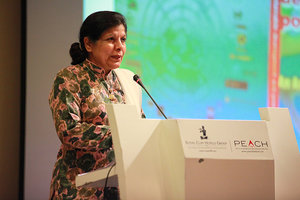UN Official: Empower Women for Sustainable Development
 |
| ESCAP Executive Secretary Shamshad Akhtar [UN ESCAP] |
Greater integration of women in the labor market — at all levels and in all sectors — is key to equitable, inclusive and sustainable development, and a legitimate right of women. Even though women constitute 50 percent of Asia-Pacific's total working age population, their participation in formal employment is uniformly lower than that of men. In many countries in the region, the national female employment-to-population ratios are below 50 percent, which is not the case for men. In some countries, the female employment-to-population ratio is below 30 percent. Moreover, the contribution of women to the economies of Asia and the Pacific, through household and informal sector labor, is recognized but unrecorded in the national accounts.
Gender-based discrimination is pervasive and goes beyond labor force participation, as social and cultural taboos perpetuate discriminatory and restrictive traditional gender roles in different aspects of women's and men's lives. There is a cost to gender discrimination and inequality. UN estimates reveal that low participation by Asia-Pacific women in the labor market bears an opportunity cost of more than $89 billion a year.
In South Asia and Central Asia, for example, the lower employment rates of women result in an average national income loss of nearly 19 percent and 16 percent. A World Bank analysis illustrates that if women's economic activity were on par with men's, economic growth in many Asia-Pacific countries could increase by as much as 18 percent.
Equally disconcerting are trends in key Asia-Pacific social indicators. For instance, the region accounts for close to 40 percent of the world's maternal deaths, and up to 70 percent of women in the region experience violence. Female literacy levels in some pockets of South and South West Asia are below 50 percent, and women's participation in national legislatures is, in too many instances, below 10 percent.
The year 2015 marks the 20th anniversary of the adoption of the Beijing Declaration and Platform for Action, which is the global agenda for achieving gender equality and advancing the status of women and girls. As part of the 20-year review, governments in Asia and the Pacific have identified women's economic empowerment, political participation and the elimination of violence as fundamental to our future, and a priority for achieving gender equality in the region.
This week, at the "Asian and Pacific Conference on Gender Equality and Women's Empowerment: Beijing+20 Review", ministers and other policymakers from across the region will have the opportunity to renew their political commitment to empower women and advance their status in all sectors.
Providing an impetus to the debate, the G20, which includes eight countries from the Asia-Pacific region, has called for reducing the gap between female and male labor force participation in their countries by 25 percent. Realization of this goal by 2025 — no small feat — would add 100 million more women to the labor force.
Asia and the Pacific could lead the way in this area. Facilitating women's integration in formal employment, governments and the private sector need to, for instance, embrace flexible working hours and telework, tailored tax systems based on personal income (rather than family incomes), and provide high-quality affordable child and elderly care services. Such measures reflect a growing global and regional commitment to increasing the rates and quality of women's participation in the workforce.
Equally important is challenging the underlying stereotypes and assumptions about childbearing, parenting and the roles of women and men at home and in the workplace. In particular, the needs and interests of vulnerable groups of women workers — such as domestic workers, migrant workers, informal sector workers and rural workers — need to be addressed. Traditional gender roles that confine women to caring, cashiering, cleaning, catering and clerical work must be revisited, if the "glass ceiling" is ever to be fully dismantled and the "sticky floor" cleaned.
Significant and substantive gains for women's economic empowerment, and for gender equality more generally, require more resources, greater accountability, stronger partnerships and institutions, and better regional cooperation.
The author is an under-secretary-general of the United Nations and executive secretary of the Economic and Social Commission for Asia and the Pacific (ESCAP). She is also the UN's Sherpa for the G20, and previously served as governor of the Central Bank of Pakistan and vice-president of the MENA region of the World Bank.
(Source: China Daily)
Please understand that womenofchina.cn,a non-profit, information-communication website, cannot reach every writer before using articles and images. For copyright issues, please contact us by emailing: website@womenofchina.cn. The articles published and opinions expressed on this website represent the opinions of writers and are not necessarily shared by womenofchina.cn.

 京公网安备 11010102004314号
京公网安备 11010102004314号